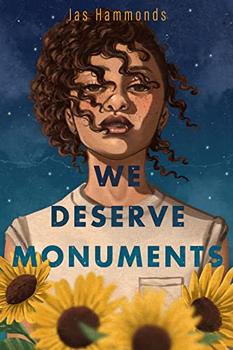Summary | Excerpt | Reviews | Beyond the Book | Read-Alikes | Genres & Themes | Author Bio

This article relates to We Deserve Monuments
 The city versus country trope is as old as Aesop's fabled mice, yet the debate continues to warrant new narratives. In Jas Hammonds' We Deserve Monuments, the protagonist, Avery Armstrong, puts this very debate to the test when she moves to the small fictional town of Bardell, Georgia. Raised in the cultural mecca of Washington, D.C., Avery views the move as temporary, something to be tolerated for a short period of time until she can get back to the life she knows. Her initial misgivings are not unfounded. Many individuals who are contemplating moving from a diverse city fear that small towns harbor small minds, allowing for insidious racism, discrimination and homophobia to prevail. And while Avery does confront these very issues, she finds the power of friendship and family help her combat them. Small-town life inspires close connections, as she excavates her family history and finds the deep and abiding friendships necessary to navigate coming of age. In fact, halfway through the novel, Avery feels that Bardell makes life "manageable, predictable, peaceful even," while her mother bemoans living "in the middle of nowhere."
The city versus country trope is as old as Aesop's fabled mice, yet the debate continues to warrant new narratives. In Jas Hammonds' We Deserve Monuments, the protagonist, Avery Armstrong, puts this very debate to the test when she moves to the small fictional town of Bardell, Georgia. Raised in the cultural mecca of Washington, D.C., Avery views the move as temporary, something to be tolerated for a short period of time until she can get back to the life she knows. Her initial misgivings are not unfounded. Many individuals who are contemplating moving from a diverse city fear that small towns harbor small minds, allowing for insidious racism, discrimination and homophobia to prevail. And while Avery does confront these very issues, she finds the power of friendship and family help her combat them. Small-town life inspires close connections, as she excavates her family history and finds the deep and abiding friendships necessary to navigate coming of age. In fact, halfway through the novel, Avery feels that Bardell makes life "manageable, predictable, peaceful even," while her mother bemoans living "in the middle of nowhere."
It turns out "townsizing," the migration from a big city to a small town, is a thing — so much so that HGTV has created a podcast in its name, showcasing "the people who are creating community, building legacies and shattering stereotypes about small town life." In fact, many of the episodes confront issues of racism, homophobia, bigotry and narrow-mindedness head-on. Townsizing Episodes 4, 6, and 7 include interviews with people of color and queer individuals and couples relating their experiences in smaller towns. Much of the podcast's findings run in tandem with Avery's experiences in Bardell: small towns are not devoid of prejudice, but a network of good friends and neighbors can combat these societal ills.
With working from home becoming a more common option, small towns have become increasingly attractive due to their lack of traffic and pollution, and the lower cost of living. Many smaller towns and cities are even offering cash incentives to potential new residents. Muscle Shoals, Alabama, for instance, is ready to shell out $10,000 to make you a neighbor. Many of these incentives aim to draw young people and families to the region.
It would seem that living in a small town as a teenager like Avery in We Deserve Monuments has some advantages, with the right infrastructure in place. The Townsizing podcast did some investigating on their "Being a Teenager in a Small Town" episode, and a number of observations unearthed ran in tandem with Avery Armstrong's Bardell experiences. It features an interview with Lily Fowler from Pittsboro, NC, who extols some of the virtues of small-town living during adolescence. Fowler speaks of her deep connection with her grandparents, fondly relaying how her grandpa always has a story for her about the town. Her knowledge of the town's legacy fosters her sense of community and belonging — a clear advantage for keeping teens happy and healthy. Similarly, her friends have gone to school together since kindergarten, and Lily values their intimate connection. This is another vehicle for keeping teens resilient: a positive support system. These qualities are also the very things that pique Avery's interest in Bardell: her family's history with the town, for better or worse, and her deep connection with friends Jade and Simone.
In some ways, small towns are much like families — members are inextricably connected by proximity and a common bond. Just as with family, the blessing of a small town is the depth of these connections. The lack of such connections, though, can be isolating, or even toxic. An article in Country Living on small-town life emphasizes the importance of "finding 'your people'" — the "like-minded friends" who just "'get' you." Perhaps a search for these people is a bit easier in an environment where everyone knows your name and your family. The article even extols the virtues of gossip in keeping people accountable, which may facilitate good choices in young adults. The clear advantage to small towns seems to be that they foster a familial sense of connection.
Filed under Cultural Curiosities
![]() This "beyond the book article" relates to We Deserve Monuments. It originally ran in January 2023 and has been updated for the
February 2024 paperback edition.
Go to magazine.
This "beyond the book article" relates to We Deserve Monuments. It originally ran in January 2023 and has been updated for the
February 2024 paperback edition.
Go to magazine.
Censorship, like charity, should begin at home: but unlike charity, it should end there.
Click Here to find out who said this, as well as discovering other famous literary quotes!
Your guide toexceptional books
BookBrowse seeks out and recommends the best in contemporary fiction and nonfiction—books that not only engage and entertain but also deepen our understanding of ourselves and the world around us.